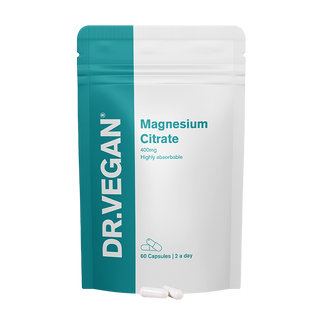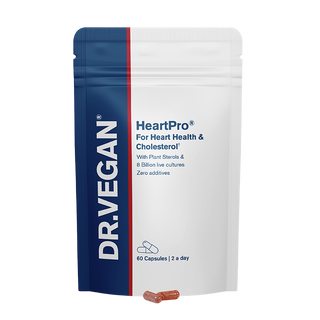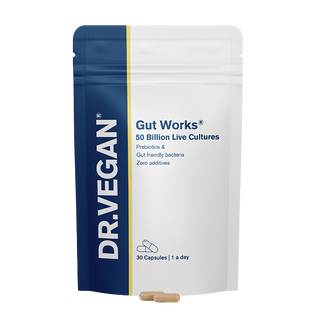5 cholesterol myths busted

8 million people in the UK take statins, according to the British Heart Foundation, and more than 200 million people worldwide take statins for heart health. Despite the rapid rise in use of statins, heart disease remains the #1 cause of death among men and women globally, which is leading people to ask if statins really are as necessary or effective as many like to believe.
Cholesterol has a bad name, and some argue it's been the case ever since the pharmaceutical industry developed statins. The easy option for GPs and healthcare professionals became to prescribe statins among people with high LDL cholesterol. The reality is that cholesterol isn't the enemy it has been made out to be. You can address your cholesterol levels naturally and through your diet, and what's more, you can avoid nasty side effects of statins. Our expert nutritionists explain cholesterol, and bust 5 myths you're likely to hear about cholesterol.
What is cholesterol?
Cholesterol is a waxy, fat-like substance that is vital in the body and is essential for producing hormones such as cortisol, oestrogen, progesterone, testosterone, Vitamin D, and bile. Our brain requires 25% of our body’s cholesterol, and cholesterol is also necessary for the wall of every cell in our body. Many age-old myths surrounding cholesterol have led to frequent misconceptions, including its effects on the body and how to manage cholesterol effectively.
Learn more about how to tell if your cholesterol levels are healthy.
Understand your diet in your free Diet Profile.
So, what does high cholesterol mean? NHS recommended total cholesterol levels in the UK are 5 mmol/L (millimoles per litre) or less for adults. For those at high risk of cardiac complications, normal cholesterol should be 4 mmol/L or less.
Too high cholesterol is a risk factor in the development of coronary heart disease (CHD), which is the #1 cause of death among men and women worldwide. CHD is when the walls of your arteries become clogged up with fatty deposits (cholesterol), which can lead to damage of the heart tissue, causing a stroke, heart attack and other major health issues. Learn more about the warning signs of a heart attack.
Your cholesterol levels vary from season to season and depend on your body’s needs. In winter, there is not enough sun to convert cholesterol into Vitamin D which leads to higher levels of cholesterol, and your cholesterol levels may also be higher when you are stressed, injured, if you're pregnant, or as you age.
When your GP recommends a cholesterol test, they measure 'HDL cholesterol' and 'total cholesterol'. Your GP may also test your 'triglycerides' as a marker of cardiovascular risk. The non-fasting triglyceride normal range in the UK is 2.3 mmol/L or below and a low triglyceride score is a good sign for your heart health.
Magnesium Citrate

5 myths about cholesterol
Myth 1: Cholesterol is Bad
HDL (high-density lipoprotein) and LDL (low-density lipoprotein) are not actually cholesterol, but are soluble proteins which combine with and transport cholesterol around the body like taxis. 'LDL cholesterol', as it's known, transports fresh cholesterol from the liver, and 'HDL cholesterol' transports it back to the liver for recycling after the body has used it.
Cholesterol in itself isn't bad. Problems with cholesterol only arise when LDL cholesterol becomes oxidised (damaged), and the particles become small and dense, leading to cardiac issues.
Myth 2: Healthy Weight = Healthy Cholesterol
Most people think that only overweight individuals need to watch their cholesterol levels. Oxidised or damaged LDL can affect anyone regardless of weight. Much higher than normal cholesterol levels may be genetic and may be due to a gene mutation on 'chromosome 19', a chromosome responsible for making proteins. A mutation of chromosome 19 is rare and can only be detected via genetic testing.
Myth 3: Cholesterol has symptoms
As cholesterol is an essential substance made in the body with internal checks and balances in place to monitor the levels, it is rare for there to be any symptoms resulting from an imbalance in cholesterol levels or damaged LDL. When oxidised LDL is present, there may be other issues simultaneously, such as high blood sugar, large amounts of abdominal fat and high blood pressure. You may enjoy reading 'How to manage blood pressure naturally'.
Myth 4: I take statins, so I don’t need to worry about cholesterol
Statins may be effective for some people, but not all people and not all of the time. Statins can not only have side effects including headaches, dizziness, muscle weakness, constipation and diarrhoea, statins also deplete essential nutrients your body needs including magnesium, zinc, vitamin D and CoQ10. High or imbalanced cholesterol doesn't have to mean you need statins - you can address your cholesterol naturally and through your diet.
Statins work by blocking an important pathway that limits the production of cholesterol. They also block the production of a vital enzyme called Co-Enzyme Q10 (CoQ10) which is required in large amounts in the heart muscle. If prescribing statins, more and more GPs are now prescribing CoQ10 alongside them. If you are prescribed statins, it is also important to maintain a healthy, balanced diet and lifestyle.
Myth 5: Cholesterol only affects people older than 50
Oxidised or damaged LDL can affect anyone of any age. Younger patients with cholesterol issues are becoming increasingly common due to the combination of higher triglyceride levels and higher levels of oxidised LDL. An increase in triglyceride levels is driven by the increased consumption of carbohydrates, ultra-processed foods and high-sugar drinks.
How to Improve LDL with Diet
There are a number of simple options to manage cholesterol naturally through dietary changes.
Adopt a plant-based diet
Plant-based diets are one of the best diets for individuals with oxidised LDL issues. Plant-based diets provide plant sterols that reduce inflammation which in turn reduces the damage caused to LDL. Learn more in the 7 health benefits of a plant-based diet.
High-fibre diet
High-fibre diets are excellent for those with high levels of oxidised LDL. They provide a food source for probiotics in the gut, which metabolise bile when thriving. Bile is created in the body from cholesterol, and metabolised bile cannot be reabsorbed, so gut health is vital for its excretion. You may also enjoy 'What your poo says about your health'.
Kimchi
Kimchi is fermented vegetables, including cabbage and radish, and a traditional Korean food. Kimchi is rich in antioxidants which have a protective effect on cholesterol and arterial health. Research has found that a high intake of kimchi has a beneficial effect on total cholesterol concentrations and is especially effective in individuals with arterial health issues.
Avocados
Avocados are a nutrition powerhouse hailed by nutritionists and health gurus. Research has shown that eating just one avocado daily increases the level of antioxidants in the blood, protecting cholesterol from oxidation. Oxidised cholesterol is a dangerous form and is most likely to contribute to heart disease.
HeartPro® is a daily formula of clinically studied ingredients, including plant-sterols for lowering cholesterol, with probiotics and essential nutrients to protect and support your heart health every day. Discover HeartPro® today.
Cholesterol needn't be confusing. With an active lifestyle and healthy diet choices, we all can take better care of our cholesterol levels.
You may also enjoy reading:
- Warning signs of a heart attack
- How to manage blood pressure naturally
- Why the hype about Apple Cider Vinegar?
Discover our range of award-winning vegan supplements and probiotics.
Want to hear more from our nutritionists? Sign up to our free newsletter:



















